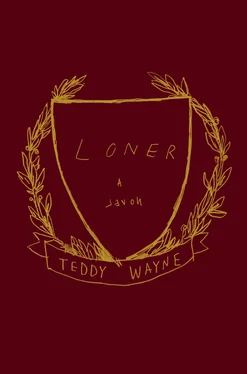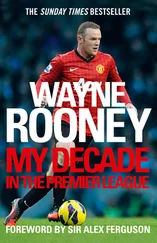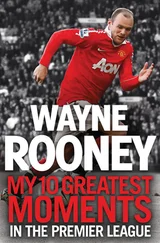I awaited your response, my calves tensing, the soles of my feet rising as if in high heels.
A sigh of resignation — you knew I was right — and you turned the laptop back to me.
In spite of your ethical reservations, however, once again you didn’t contribute at all toward the paper’s thesis:
The story implies — perhaps in a manner the author herself was not aware of — that the narrator’s desire to write is wedded to her “temporary nervous depression.” The hysterical female’s creative expression comes at a steep cost: her own mental stability.
“How’s that?” I asked after reading it aloud.
“Oops,” you said, looking up from your phone. “I was taking care of a text. Can you read it again?”
I repeated myself. “That’s really good,” you said. “And didn’t Samuelson say that Gilman went crazy once she had a kid? So that makes sense that she’d write about a hysterical woman, since she was one herself.”
The gulf between how you spoke now and hours earlier in your gender class was remarkable — like a preteen girl here, a seasoned academic there — but I reminded myself that this was a lower-priority course for you. You fielded messages from your buzzing phone while I typed on, feeling as though I’d rescued you from a leaky dinghy and was captaining you to shore in my sturdy vessel.
You listened to a voice mail then made a call, hiding the phone and speaking in a library whisper.
“Mom,” you said. “The pharmacy here is out of Ambien. I need you to have Sharon FedEx me a bottle tomorrow.” You waited. “ Yes , I need it tomorrow, you know it’s the only way I can fall asleep.”
As you talked to her, a shirtless boy ran through the library screaming, “Yale sucks!”
“You going to the Game?” I asked when you were off the phone.
That Saturday was the (football) Game between Harvard and Yale, in all its capitalized and singular hubris (like “the Yard,” somewhat like “the city”). I wasn’t planning to attend, especially now that I’d been excommunicated by the Matthews Marauders, but it occurred to me that you would likely be there.
“Yeah.” You blew your nose on a tissue, and when you set it down a fleck of dried snot protruded from your right nostril like an icicle, shivering in the breeze of your exhalations. I didn’t say anything, not only because it’s hard to summon the tact to tell anyone, least of all you, she has snot in her nose, but because it was so human, so imperfect.
(See? I didn’t just idealize you. I wanted it all: the beauty and the ugliness, the lush hair and the encrusted mucus. Show me someone else who accepted your totality like I did.)
“Cool,” I said. “Maybe I’ll see you there.”
You produced an unconvincing cough. You’d done so at increasingly short intervals for the past twenty minutes, but this time you took it further, moaning and rubbing your temples like an actress in a cold-remedy commercial.
“Fuck,” you said. “I think I’m coming down with something.”
You sputtered more from your prone position, hacking in a staccato fit but briefly recovering to respond to an incoming text. I’d seen better performances from grade school malingerers.
“I don’t know,” you said. “I think maybe I better call it a night.”
“Okay,” I said, snapping your laptop shut.
“Wait — did you send it to yourself?” you asked.
“No, it’s your essay. Why would I need to send it to myself?”
“You’re not going to…” You looked crestfallen. “You can’t help me with the rest?”
It was outrageous, asking me to spend the night in the library cheating for you so you could skip off to Liam’s party — with you thinking I had no idea what you were up to.
“Yeah, I guess I could.”
“Great,” you said, smiling with relief. “I’ll e-mail you what we have so far.” You sent me the document and packed up, leaving me alone in our nook.
Ll’I liam-e uoy tahw ew evah os raf.
I waited a minute before hurrying out of Lamont to catch you in the act.
Ahead of me in the Yard, you turned left through a gate and onto Mass Ave. Yet, instead of going south to Liam’s final club (or University Health Services, not that that was ever a consideration), you made a right. You might be meeting him at a bar, in which case I couldn’t enter behind you. I kept trailing you anyway, with a wide enough berth that you wouldn’t see me even if you happened to look over your shoulder.
After several turns we ended up off campus on Story Street. You stopped at a house and pushed the buzzer. Based on the current information in the student directory, Liam still lived in Adams, and the house didn’t appear to be the site of a party; it was quiet, and the only light came from a single third-floor window.
Moments later the front door opened and you stepped inside. I couldn’t see who let you in. I prowled closer to see the name under the buzzer to the third floor: MEYERS/BUR, it read, before the cramped handwriting ran out of space.
I walked away, googling “Meyers and Cambridge” but coming up with nothing specific no matter how many Harvard- and address-based modifiers I added. My phone purred with a Facebook notification. You’d posted a photo of me in the library (I hadn’t noticed you take it) with the comment “Long night studying at Lamont with David Federman.” My privacy settings continued to prevent anyone from adding to my own spotless wall. Yet now you were advertising the fact that we were hanging out alone for the whole night. You were even presenting evidence to the world of my writing your essay for you, not that the picture alone could prove it, but you trusted me not to spill our secret. I fiddled with my settings and allowed the picture on my wall, its solitary graphic. Sara had unfriended me and wasn’t connected to you — not that I needed to worry about what she thought anymore.
I shouldn’t have doubted you. I’d misread the half-written BURin my haste; it was actually BAR, for “Barrows”—the student directory was erroneous — and Meyers was Liam’s roommate. You were sicker than I’d thought and were sleeping it off at his place.
It was odd, though, that you’d posted the photo just now, after we were no longer together.
And suddenly I remembered another surname that began with BUR. I googled “Lucy Meyers.” The first hit was the faculty page for a professor of comparative literature at Colby.
Each time Tom Burkhart had been nearby or discussed you seemed so coltish. Those tears, the rapidly responded-to texts, the phone call in the hallway — they had nothing to do with Liam.
And that was why you’d gleefully tagged me on Facebook, to make it appear that you and I hung out (or were “studying”) more often than we actually did so that Liam would think you were with innocuous David Federman, not Tom — both now and during the blackout. Maybe you’d used me as an alibi other times, too. I felt cuckolded, strangely, on dim Liam’s behalf; you were cheating on both of us. Of all people, Tom — grandstanding, philandering, bearded-and-bespectacled-cliché Tom — shouldn’t have been the one who got you.
It made sense, too, why you’d enlisted me to write your essays. Tom was grading them; you wanted to impress him and earn your As, should his postgraduate integrity ever be questioned.
You wouldn’t understand, you’d told me, but now I did. I’d make sure you understood, too.
I completed your essay by Friday afternoon, neglecting my own; it was more important to craft something awe-inspiring to hand in to Tom, that charlatan, who, in heaping hosannas on the paper, would be unwittingly steering you toward the genuinely brilliant scholar in your life. If there’s a Charlotte Perkins Gilman Quarterly journal out there, I invite its editors to track down those ten and a half pages and publish them. I e-mailed it to you and wrote:
Читать дальше












